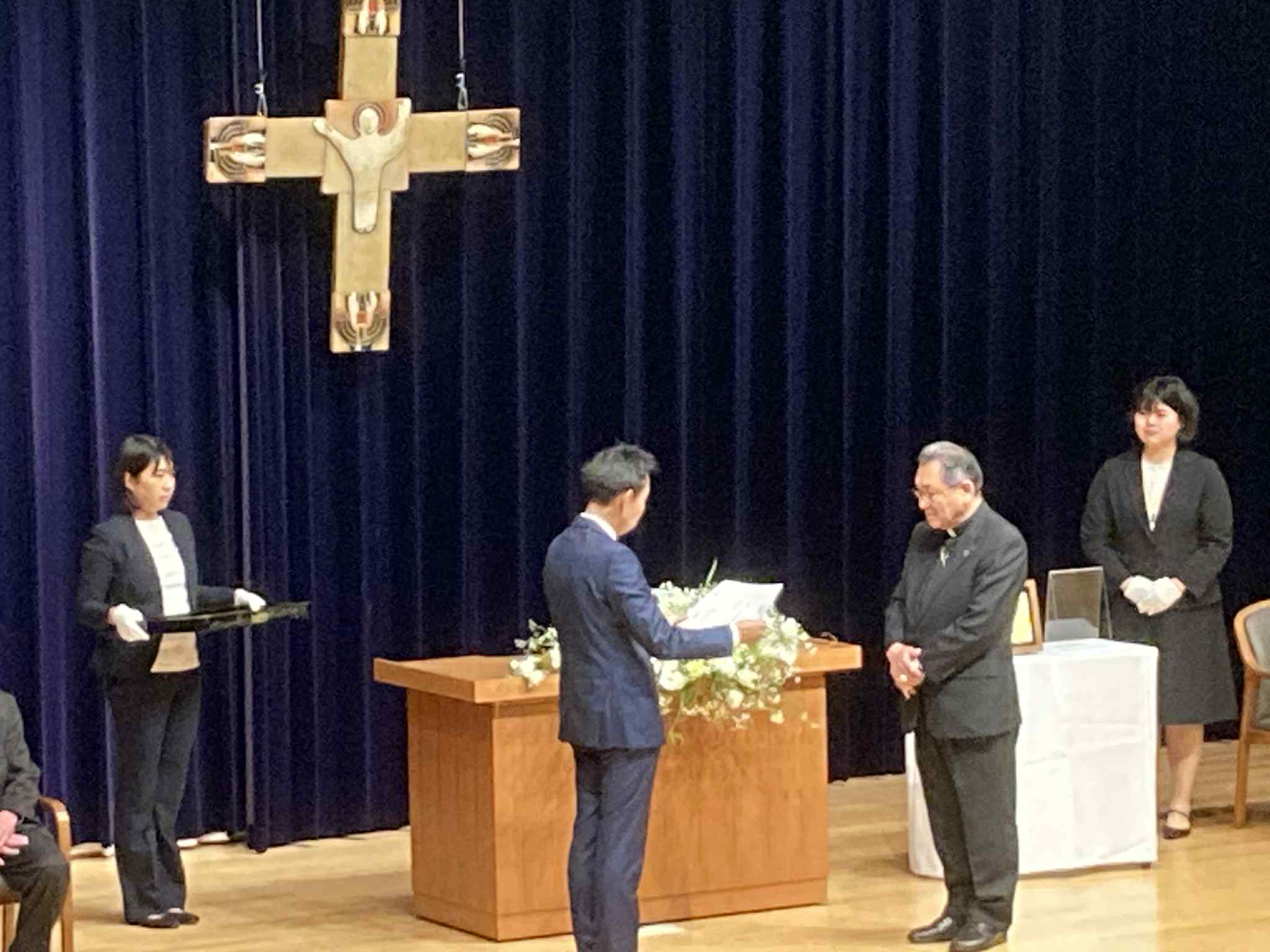Caritas Internationalis gets award in Nagoya for defending humanity
The Catholic charity is the fourth recipient of the Human Dignity Award by Nanzan University, a Catholic institution. Caritas President Card Kikuchi, archbishop of Tokyo and a former student, collected the prize. In his address, the prelate mentioned Caritas’s missionary origins, and its transformation into a confederation of 162 national chapters, involved in ongoing emergencies, like Gaza, Ukraine and Myanmar. He noted that the organisation does “not act for the poor – we act with them". It is never a "stranger", but always "part of the community".
Tokyo (AsiaNews) – Caritas Internationalis received the Human Dignity Award, now at its fourth edition, from the Nanzan University, a Catholic higher education institution in Nagoya, in a ceremony held on 7 June.
“In a world where religion can often be used as a political tool, the work of Caritas demonstrates that religion can still play a significant role in protecting human dignity across borders through earnest efforts in specific areas of difficulty,” reads the motivation
Cardinal Tarcisio Isao Kikuchi, Archbishop of Tokyo and president of Caritas Internationalis, accepted the award at the establishment where he once studied.
“Hominis Dignitati (For Human Dignity) has been the motto of Nanzan School Cooperation and as an alumni of the Nanzan, starting from Junior High to Graduate School of Theology, this motto has been deep inscribed into my heart,” said the 66-year-old cardinal.
Kikuchi, a Verbite former missionary in the rural villages of Ghana, was appointed president of Caritas Internationalis in 2023. In May of this year, he participated in the Conclave that elected Pope Leo XIV; he was elevated to the rank of cardinal in Pope Francis’s last consistory.
The archbishop began working with Caritas in 1995, as a volunteer in a refugee camp in Bukavu, Democratic Republic of Congo. Subsequently, he arrived at Caritas Japan, becoming its executive director and president, and eventually Caritas Asia.
Founded by the Verbite missionary congregation, Nanzan University established the award in 2021 as it prepared to celebrate the 75th anniversary of its foundation. Its purpose is to honour individuals or organisations that work to protect human dignity, as highlighted in the motto, reflecting a commitment to personal integrity and mutual respect.
Kikuchi said he accepted the award “on behalf of everyone involved in the work of Caritas all over the world.” He also explained that this year’s Human Dignity Award is not dedicated to a single “institution.”
With a mandate “that has spanned over seven decades, reached across every continent and touched the lives of millions,” it is a service before being a job, and first and foremost a mission “rooted in the conviction that every person – no matter where they come from, no matter their circumstance – is imbued with sacred, inviolable dignity,” the archbishop said.
The awarding of the prestigious prize was an opportunity to look back at the work of Caritas Internationalis, which was officially founded in 1951 “in a post-war world hungry for healing”.
“Caritas began as a gesture of mercy, but quickly evolved into a global movement of love and justice,” the cardinal explained, becoming a global community of 162 national Caritas over the decades. It “has grown not merely in size but in spiritual and moral responsibility,” the prelate added.
“We have walked with people through famines in Africa, civil war in Lebanon, tsunamis in Asia, pandemics, natural disasters, and complex humanitarian crises.” In such places Caritas has never been a “stranger,” but “part of the community.”
“We do not act for the poor - we act with them. We listen before we respond. We learn before we lead. Because human dignity requires more than food or shelter. It requires presence, participation, and partnership,” Kikuchi said.
The prelate also mentioned the objectives to be achieved by 2030, laid out in the 22nd assembly, noting that Caritas “is more than an NGO”. It is “the caress of the Church to her people,” as Pope Francis put it.
In short, Caritas Internationalis is clearly not an “accessory”, but the heart of the mission of the Church. It works in a synodal way with bishops, lay people and men and women religious.
It responds to humanitarian crises with rapid and dignified interventions, promotes inclusive economies, invests in the leadership of women and young people, and gives voice to the communities most affected by war, inequality and climate change.
Kikuchi also mentioned some of the emergencies that Caritas has faced around the world in recent years. Haiti, Gaza, Ukraine, Turkey, Syria, Ethiopia, and others “are not just names on a list; they are communities where our teams walk with people through their most vulnerable moments,” he explained.
Eight new emergency interventions are planned for this year in Myanmar, South Sudan, the Holy Land, the Democratic Republic of Congo, Ukraine, Bangladesh and Yemen, "totalling over 29 million euros (US$ 33 million) in needed support,” said the Caritas president.
Last December, Caritas Internationalis launched the campaign "Turn Debt into Hope”, which “seeks to reframe the narrative around debt in the world’s most indebted countries," the archbishop explained.
This is another effort towards the commitment that Nanzan University recognised. “This award may bear our name, but it honours the dignity of countless others,” Kikuchi added.
(Nirmala Carvalho contributed to this article)
02/01/2024 17:19
23/04/2021 19:11







.png)










